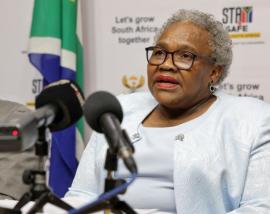
Social Development Minister Sisisi Tolashe has reassured social grant recipients that the grant system's integrity remains intact, supported by various control measures and enhanced security.
The Minister was briefing the media on Wednesday on the outcomes of the independent investigation into the COVID-19 Social Relief of Distress Grant (SRD grant) in Cape Town.
“We assure our clients that the integrity of our system remains intact, with various control measures and enhanced security in place to ensure efficient service delivery.
“SASSA will continue to invest in its systems to enhance support and positively impact the lives of our clients. We strive to balance security and improvement with client interaction, accessibility,” she said.
This comes after two first-year students from Stellenbosch University raised the alarm over vulnerabilities in the South African Social Security Agency’s (SASSA) application systems, sparking a parliamentary investigation.
Their allegations, shared on various media platforms and during a presentation to the Portfolio Committee on 23 October 2024, questioned the integrity and security of SASSA’s digital grant platforms.
The two students found that fraudsters were using unsuspecting citizens' identity numbers to apply for the SRD grant and received the funds in bank accounts using the same ID numbers. This potentially eliminated deserving people from accessing government relief.
In response to the allegations, Parliament recommended a comprehensive investigation of the Social Relief of Distress Grant system and all other grant systems administered by SASSA.
Parliament’s directive reflected concerns over the integrity and security of SASSA’s digital systems across various grant types, including but not limited to Child Support, Disability, Old Age Pension, and Foster Child grants.
As a result, the Minister of Social Development committed to a thorough review of its entire grant infrastructure, focusing on identifying and mitigating potential vulnerabilities, ensuring the security of beneficiary data, and safeguarding public resources.
The Minister told the media that key findings in the investigation revealed that there were several medium vulnerabilities identified.
“As technology evolves rapidly, it is crucial for any organisation to stay abreast of advancements, continuously monitor risks, and adapt to ensure not only compliance but also excellence in using technology to drive and implement new solutions.
“We strive to balance the need for security with the equally important need for client accessibility, ease of use, and service excellence,” she said.
The Minister acknowledged that technological advancements brought risks such as cyber threats and vulnerabilities. The SRD program, like many others in South Africa's retail and banking sectors, has faced challenges like identity theft.
Since 2023, Tolashe noted that SASSA has intensified its efforts against fraud, working closely with law enforcement agencies.
“We have introduced facial biometrics through our electronic Know Your Client program and strengthened relationships with other government entities and the banking industry.
“Our 'Know Your Grant Status' programme helps individuals determine if identity theft has occurred in the SRD environment. Our staff is committed and currently performing outreach programmes over weekends to assist our clients in addressing and swiftly resolving these issues,” she said.
The Minister acknowledged the audit report and the work done to assist department in its oversight role and SASSA in strengthening its systems.
She emphasised that SASSA management was currently reviewing the report, which aligns with the findings of the penetration tests and vulnerability scans.
“We will meet with the auditors to discuss the report and provide a comprehensive response. SASSA will continue to support the auditors in completing their work,” she said.
The Minister highlighted that the COVID-19 pandemic presented unprecedented challenges, particularly for SASSA who had to implement the SRD grant.
“We had to adopt a unique approach since potential applicants were not part of any existing government grant support programs, and COVID-19 regulations restricted physical interactions.
“Despite these hurdles, we successfully implemented an online program and disbursed the first grant on 15 May 2020, reaching 6 million new clients in record time,” Tolashe said. – SAnews.gov.za


